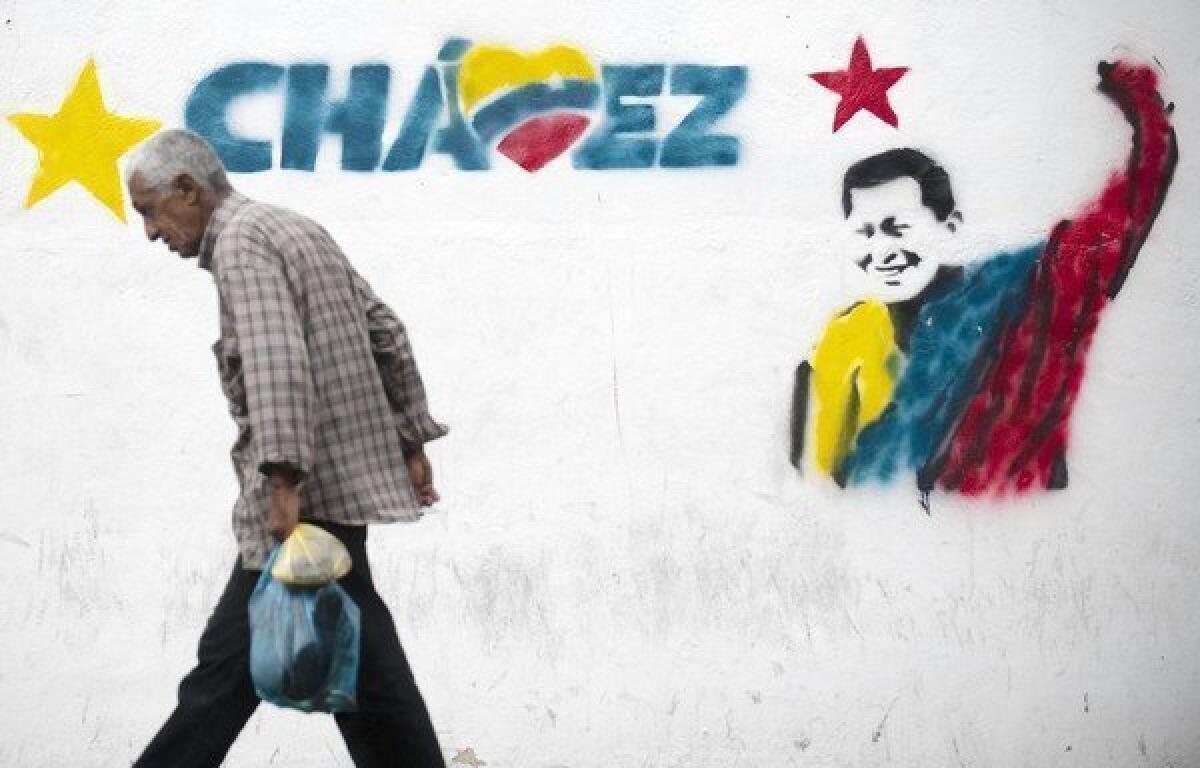Economists see painful cuts coming for Venezuela

CARACAS, Venezuela — As perishable foodstuffs rotted on cargo ships that had waited three weeks to unload at Venezuela’s largest port, unsettled consumers this week found shelves at Caracas’ main downtown market devoid of rice, cooking oil, sugar and other items.
Widespread scarcities and chaos at the nation’s main ports, including Puerto Cabello, are just some of the problems Vice President Nicolas Maduro will face as he takes the reins of power in the absence of President Hugo Chavez.
Chavez is recovering from cancer surgery in Cuba, and his return is uncertain.
Other pressing issues include a 20% inflation rate, a ballooning government deficit and price controls that have created a thriving underground market in food staples. Despite an oil bonanza, U.S. dollars are scarce and worth four times the official rate on the foreign-currency black market.
Economists say Maduro will be forced to institute several unpleasant economic measures, possibly including spending cuts that would be especially hard on the poor, the Chavez government’s chief beneficiaries.
Alejandro Grisanti, head of Latin America research at Barclays in New York, said sharp spending cuts were necessary after an “unsustainable” 2012 budget deficit inflated by Chavez’s election year giveaways, including apartments and appliances, that helped him to a resounding reelection victory in October.
Jose Manuel Puente, an economist at the IESA graduate school in Caracas, said Maduro — or Chavez, if he returns to power — may have to sharply devalue the bolivar, the Venezuelan currency.
“It will be an unpopular measure that will have a political cost because it will effectively cut salaries and people’s purchasing power, especially in an economy where so much of what people consume is imported,” Puente said. “The government will try to avoid doing it as long as it can, but sooner or later it will be forced to.”
Barclays’ Grisanti, who noted that the government had not adjusted its exchange rate over the last two years despite inflation rates of 27% in 2011 and 20% last year, said it should devalue the official rate to at least 7 bolivars to the dollar from the current 4.3.
Maduro may also have to reconsider Chavez’s imposition of price controls, which won the socialist regime the support of poor voters by artificially depressing the prices of basic food items — if consumers can find them.
Price controls have also caused the shriveling of Venezuela’s domestic industries because local producers can’t afford to sell goods at the mandated low prices, according to Ismael Perez, director of the Conindustria, the nation’s leading business association of manufacturers.
Venezuela’s manufacturing sector has lost 150,000 jobs over the last decade, and the country must now import products such as sugar, rice, coffee, milk and beef, all of which Venezuela was self-sufficient in before Chavez took power.
With domestic production shrinking, the country has had to step up imports just to feed its population. Imports last year totaled $52 billion, Puente said, a 14% increase from their value in 2011 and five times what Venezuela averaged in imports a decade ago, Perez said.
Aggravating the problem, the government has not added port and transportation infrastructure to keep up with the rising tide of imports, Perez said. That’s created huge bottlenecks at the three major port facilities, as seen this week at Puerto Cabello.
Industry sources say the heavy hand of the Chavez government has added to the delays. For example, any producer or importer of medicines or food can sell the goods only where permitted by the government’s so-called Mobilization Guide, an agency set up two years ago to ease the chronic shortages.
In Chavez’s absence, the government continues to blame manufacturers for the shortages. Just this week, it seized products and facilities owned by PepsiCo Inc. and food conglomerate Polar, accusing the latter of hoarding.
Barclays’ Grisanti sees a slowdown in the Venezuelan economy this year to less than 1% growth, after a 5% expansion last year.
“Adjustments are going to be made, and people are going to feel them,” he said.
Kraul is a special correspondent. Special correspondent Mery Mogollon contributed to this report.
More to Read
Sign up for Essential California
The most important California stories and recommendations in your inbox every morning.
You may occasionally receive promotional content from the Los Angeles Times.










